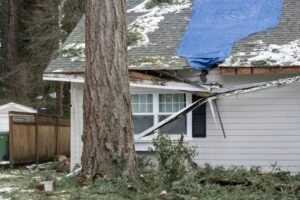
If your home has been damaged or destroyed in a hurricane, the steps you take in the aftermath can significantly affect your safety and your insurance claim. From securing shelter to documenting every detail of the damage, acting quickly and carefully can make all the difference.
Once it’s safe to do so, you should notify your insurance company and begin gathering evidence to support your claim. However, dealing with insurers—especially after a disaster—can be frustrating and complex. A Corpus Christi hurricane damage claims lawyer can protect your rights and help you fight for the compensation you need to recover and rebuild.
Ensure Your Safety
If you need to (and can) leave your home to protect yourself, do so. Get to a hotel or relative’s house. If that is not possible, go to the nearest hurricane shelter.
If you are unable to leave your home, call 9-1-1 for rescue services.
We have offices in Houston, Corpus Christi, and Victoria; and will travel to any corner of Texas if we are capable of preventing an injustice.

Document the Damage
Thorough documentation is one of the most important steps you can take after your home has been damaged or destroyed by a hurricane. Proper records will strengthen your insurance claim and help ensure you receive fair compensation for your losses.
Begin by taking comprehensive photographs and videos of all affected areas. Capture both wide shots and close-ups to show the extent of the damage clearly. Pay special attention to:
- Areas with water damage
- Broken windows
- Roof damage
- Collapsed structures
- Any other signs of destruction
If your home has experienced flooding, record video footage showing the water levels, as well as the aftermath once the water recedes.
Inside the home, document:
- Damaged furniture
- Appliances
- Electronics
- Personal belongings
- Flooring
- Walls
- Ceilings
Don’t forget to photograph areas that may seem less obvious, such as garages, sheds, fences, and landscaping.
After capturing visual evidence, create a detailed written inventory of damaged items. For each item, include a description, approximate value, purchase date (if known), and any available receipts or warranty information. Group similar items together to make the process more organized, and highlight high-value possessions separately.
If possible, locate pre-disaster photos or documentation of your property to show the condition before the hurricane. This can further support your claim.
Finally, store all documentation—including photos, videos, and written records—in a safe, accessible location, whether that’s cloud storage, a secure email account, or physical copies kept off-site. This information will be crucial when working with insurance adjusters and verifying your claim.
Make Temporary Repairs
It’s very important to prioritize making temporary repairs to mitigate any damage. This could include:
- Placing plywood over windows
- Placing a tarp over a hole in the roof (Only do this if it is safe to do so. Do not put yourself in danger.)
- Remove large debris if possible
If you don’t make efforts to mitigate the damage, your insurance company may claim you contributed to the damage and refuse to cover the additional damage.
Representing the injured in all areas of Texas that extends back over 40 years

Notify Your Insurance Company
Contact your insurance company as soon as it is safe to do so. Prompt notification is essential to starting the claims process and ensuring you receive the assistance you’re entitled to. Be ready to provide detailed information about the incident, including the date, time, and circumstances of the damage.
Clearly explain that the damage occurred as a result of the hurricane and provide supporting details, such as when the storm made landfall and how it affected your property. If you had to evacuate, inform your insurer of your current location and how they can best reach you.
Have your policy number ready when you call if possible. Ask your insurance representative for specific instructions on filing a claim and what documentation they require. Most insurance companies will ask for photographs, videos, and a written inventory of damaged property.
You need a skilled advocate to protect your legal rights and present your claim in such a way as to maximize your recovery.

Determine Which Insurance Policy Applies
Understanding your insurance coverage is crucial when preparing for hurricane season in Texas. Standard homeowners insurance typically covers damage from wind and hail, but it often excludes flooding—a common consequence of hurricanes. Therefore, homeowners may need to purchase separate flood insurance, which is available through the National Flood Insurance Program (NFIP) or private insurers.
For residents in coastal areas, windstorm damage might not be covered under standard policies. In such cases, the Texas Windstorm Insurance Association (TWIA) offers wind and hail coverage.
Determine What Your Insurance Policy Covers
Some insurance policies only cover specific losses and expenses. Some cover additional things like additional living expenses, which includes the cost of living in a hotel while you wait for your property to be repaired.
File a Claim with Your Insurance Company
There are several specific steps to take when filing a claim with your insurer:
- Notify your insurance company as soon as it’s safe.
- Provide details about when and how the damage occurred.
- Take photos and videos of all damage, including flooding, broken windows, and roof issues.
- Create a written inventory of lost or damaged items with estimated values. Keep receipts for temporary repairs and expenses.
- Be available for inspections whenever possible. Your insurer will assign an adjuster to inspect the damage. You want to be present during this to ensure your claim is being treated fairly.
- Make notes of each conversation you have with your insurance company. Be sure to save any emails or voicemails you receive. These can be beneficial if you later need to sue your insurer for bad faith.
If your claim is delayed, denied, or underpaid, consult an attorney, especially if you suspect bad faith or unfair claim practices. You can also contact our attorneys if you simply feel unequipped to manage the process of filing a hurricane damage claim.
Get Help Filing a Hurricane Damage Claim or Appealing a Denial
If your property has been damaged by a hurricane, managing the insurance claims process can feel overwhelming. This is especially true if your initial claim is denied. You don’t have to face this challenge alone. A Texas property insurance claim lawyer can guide you through filing a new claim or appealing a denial to fight for the compensation you deserve. Don’t risk leaving money on the table—get the help you need to protect your rights and rebuild with confidence.
Call Carrigan & Anderson, PLLC, today to get started.
At Carrigan & Anderson, PLLC we can talk to you about your options and rights.


